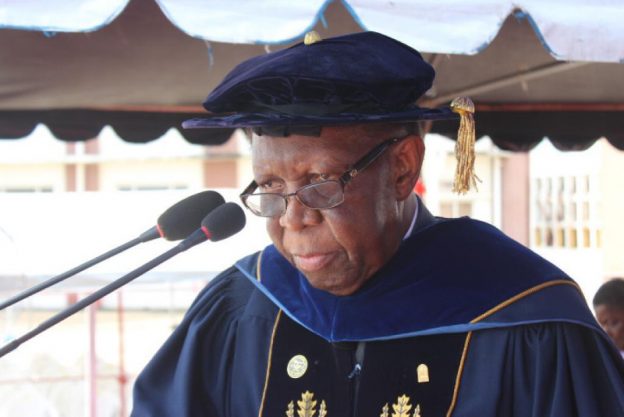Monrovia- Dr. Emmet A. Dennis, former president of the University of Liberia (UL), who served from 2008 to 2017, providing stellar leadership that resulted in major academic and policy improvements, has died, according to his family, said a statement published on the UL official website on Tuesday, March 7, 2022.
Dr. Dennis, who retired in 2017, was known to downplay his achievements, often revealing his dissatisfaction with his iconic rhetorical question: “Is the glass half full or half empty?” He would then answer, after delivering a long prose about his vision of the university, that “The glass is half empty.”
Evidence now shows that despite Dr. Dennis’s apparent attempts to understate his achievements, he indeed accomplished a lot.
His leadership is credited with reducing academic malfeasance, improving the institution’s academic profile, increasing student enrollment, attracting external grants and forging linkages and partnerships, as well as upgrading the curricula by adding new colleges and programs, among others.
In 2008, when he became president, the University of Liberia had only 13 faculty members with doctorate degrees and the institution was plagued with severe academic malfeasance. It was widely believed at the time that students bought their way into the university, creating a learning environment that was generally unmanageable and not conducive.
In 2008, for example, whether or not as confirmation of the alleged unscrupulous admission practice, the UL admitted a record 8,000 freshmen.
In order to address a culture of academic malpractices, Dr. Dennis implemented a number of policies and programs that discouraged impropriety and boosted the morale of the faculty and staff.
Dr. Dennis created opportunities for continuous education and provided numerous faculty training internally and abroad; he raised faculty and staff salary and benefits and forged numerous partnerships and linkages to enable faculty pursue advanced degree; he consulted regularly with faculty by increasing the pace at which faculty-senate meeting was held; expanded the administration in response to the increasing demands of the university, and ensured those in leadership positions were held accountable.
From 2009 to 2014, 33 faculty members received doctoral degrees; 22 law faculty received advanced degrees in Laws (an increase from four); 84 doctors graduated from the medical school (an increase from 32 for the period 2000-2007). In 2016, the University graduated 42 doctors, making it the highest number the school had graduated since its establishment.
These initial reforms, however, were a harbinger for more ambitious ones to follow.
To underscore the problem, Dr. Dennis noted the following at a 2016 retreat: “During the initial stages of Liberia’s and the University’s recovery from conflict, enrollment in the college of Business and Public Administration overwhelmed enrollments in all of the other colleges, essentially because of availability of faculty to ensure graduation at a reasonable time (compared with disciplines such as the Sciences, Engineering, Agriculture which had insufficient qualified faculty and virtually no laboratories.)”
According to the UL Office of Enrollment Services (OES), in 2009, enrollment in the College of Business and Public Administration constituted 46% of the total undergraduate enrollment, while undergraduate enrollment in Science, Engineering and Agriculture accounted for only 21% of total undergraduate enrollment.
However, by 2015, the impact of reforms initiated by the Dennis Administration paid dividends: enrollment in Business College was down to 36 percent; conversely, total enrollment in the non-business colleges climbed to 35 percent, according to data from the Office of Student Services.
The shift in student enrollment can be attributed to the intentional leadership policy instituted by the Dennis Administration that pivoted the University toward a balanced student make-up.
Today’s total enrollment at the University of Liberia stands at 18, 396 students, with a breakdown among colleges as follows: Liberia College of Social Sciences and Humanities (1985 students); the W.V.S. Tubman College of Education (1,205 students), the College of Business and Public Administration (6,152 students down from 12,435 in 2013), the T.J.R. Faulkner College of Science and Technology-Engineering (3,109, students), the William R. Tolbert College of Agriculture and Forestry (2260 students) and the David A. Starz-Sinje Technical & Vocational College is 215.
Dr. Dennis would take great solace in this student make-up. He was largely respected as a student-centered president, affording students through their various organizations an unhindered access to his office.
One of the biggest rewards for student leaders was the “experiential learning ” program, opening a channel for university students to travel to the United States for three weeks to interact with their counterparts.
The current debate surrounding the need to adequately fund the University was also a major priority focus during the tenure of Dr. Dennis.
While he often acknowledged and appreciated the Government of Liberia’s budgetary support to the university, like many of his predecessors, he sometimes had his moments of frustration with the amount of funding allotted in the national budget, believing that the University was heavily underfunded given its many needs and its role.
However, it was his style of leadership that drew admiration the most. Dr. Dennis would liken the University of Liberia to a patient in an intensive care unit on artificial life support. Each time he invoked this metaphor in a speech to the faculty and staff, or on public radio, he came across as genuine, honest and was said to make the university’s case without saying too many words. He would promise and assure that the situation would improve with time and the right intervention.
Dr. Dennis’s modus operadi of constantly questioning conditions at the University of Liberia was intended to improve the standard of the institution.
His “glass half empty” mantra epitomizes this approach. He viewed the University of Liberia not just as the nation’s oldest institution of higher learning, Dr. Dennis also envisioned it in a much more broader context:The University of Liberia is West Africa’s oldest degree-granting institute.
It should consequently be second to none.
Thank you Dr. Dennis.
Rest in peace Mr. President. Rest in Peace!

